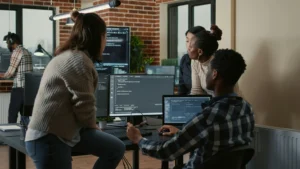
36 Business Analyst Questions and Answers
Explore essential business analyst interview questions with sample answers to help you assess technical skills, critical thinking and real-world problem-solving.
Discover insights, spark ideas, and explore expert advice on SaaS hiring. This is your space to learn, grow, and find the inspiration to build exceptional teams.

Explore essential business analyst interview questions with sample answers to help you assess technical skills, critical thinking and real-world problem-solving.

In this guide, we showcase the best SaaS management platforms to help you get the most out of your SaaS investment.

The average business analyst salary in the UK is £45,594. Get a more detailed breakdown of how pay ranges from £25k to £120k by role, region and industry.

The average data engineer salary in the UK is £55,000–£70,000 in 2025. Entry-level starts at £41k, seniors earn £100k+. See how your offer stacks up.

Discover how to build a high-performance SaaS product team structure, with key roles, examples, and frameworks to scale and align your team effectively.

Learn the optimal SaaS development team structure, key roles to hire at each growth stage and common pitfalls to avoid when building your SaaS dream team.

Discover key strategies for successful SaaS recruitment and talent acquisition to attract the right talent. Read the article to enhance your hiring process.

Explore the latest SaaS sales salary trends and compensation insights in the UK. Understand what influences earnings and make informed pay decisions. Read more!

Learn how to choose the best SaaS payroll solution for your business. Compare features, benefits and top SaaS payroll software. Read more now!

Discover how to launch a SaaS sales career. Explore key skills, roles and average salaries. Learn how to break into this fast-growing field!

Explore essential business analyst interview questions with sample answers to help you assess technical skills, critical thinking and real-world problem-solving.

In this guide, we showcase the best SaaS management platforms to help you get the most out of your SaaS investment.

The average business analyst salary in the UK is £45,594. Get a more detailed breakdown of how pay ranges from £25k to £120k by role, region and industry.

The average data engineer salary in the UK is £55,000–£70,000 in 2025. Entry-level starts at £41k, seniors earn £100k+. See how your offer stacks up.

Discover how to build a high-performance SaaS product team structure, with key roles, examples, and frameworks to scale and align your team effectively.

Learn the optimal SaaS development team structure, key roles to hire at each growth stage and common pitfalls to avoid when building your SaaS dream team.

Discover key strategies for successful SaaS recruitment and talent acquisition to attract the right talent. Read the article to enhance your hiring process.

Explore the latest SaaS sales salary trends and compensation insights in the UK. Understand what influences earnings and make informed pay decisions. Read more!

Learn how to choose the best SaaS payroll solution for your business. Compare features, benefits and top SaaS payroll software. Read more now!

Discover how to launch a SaaS sales career. Explore key skills, roles and average salaries. Learn how to break into this fast-growing field!